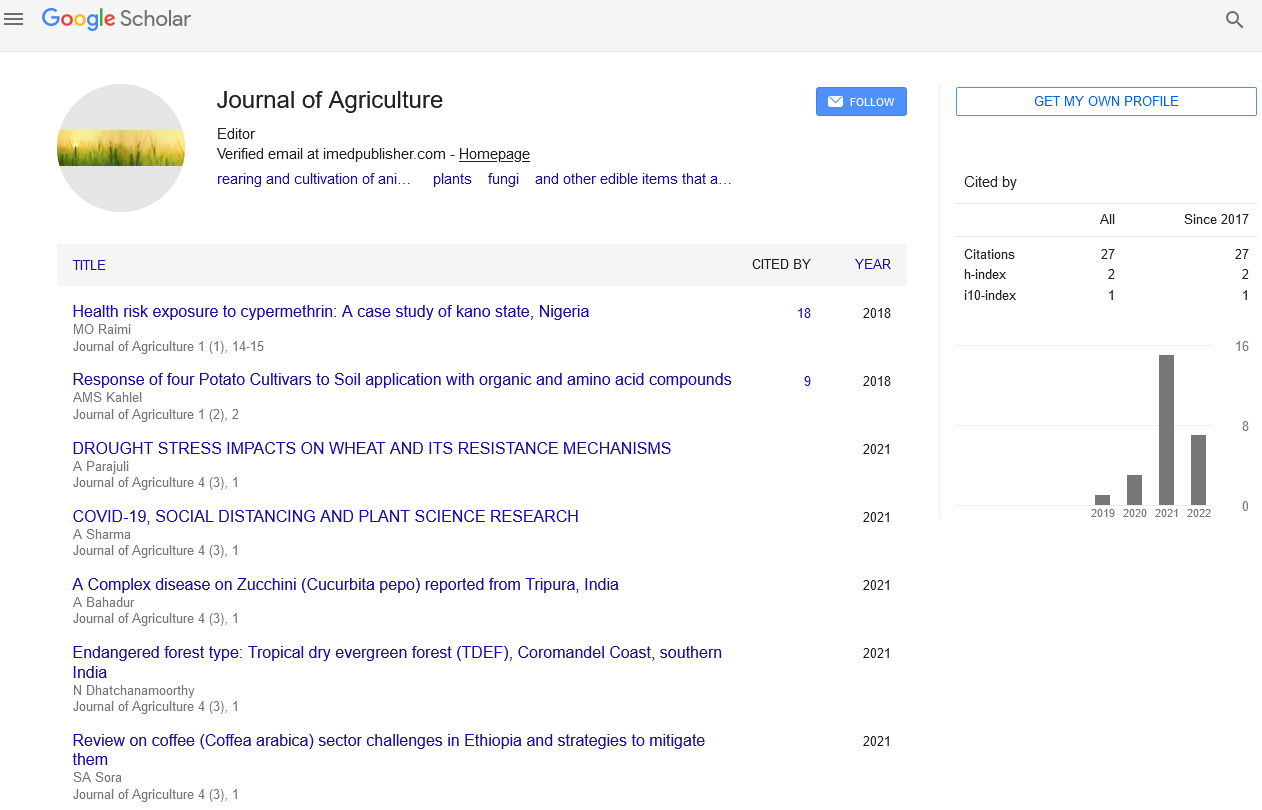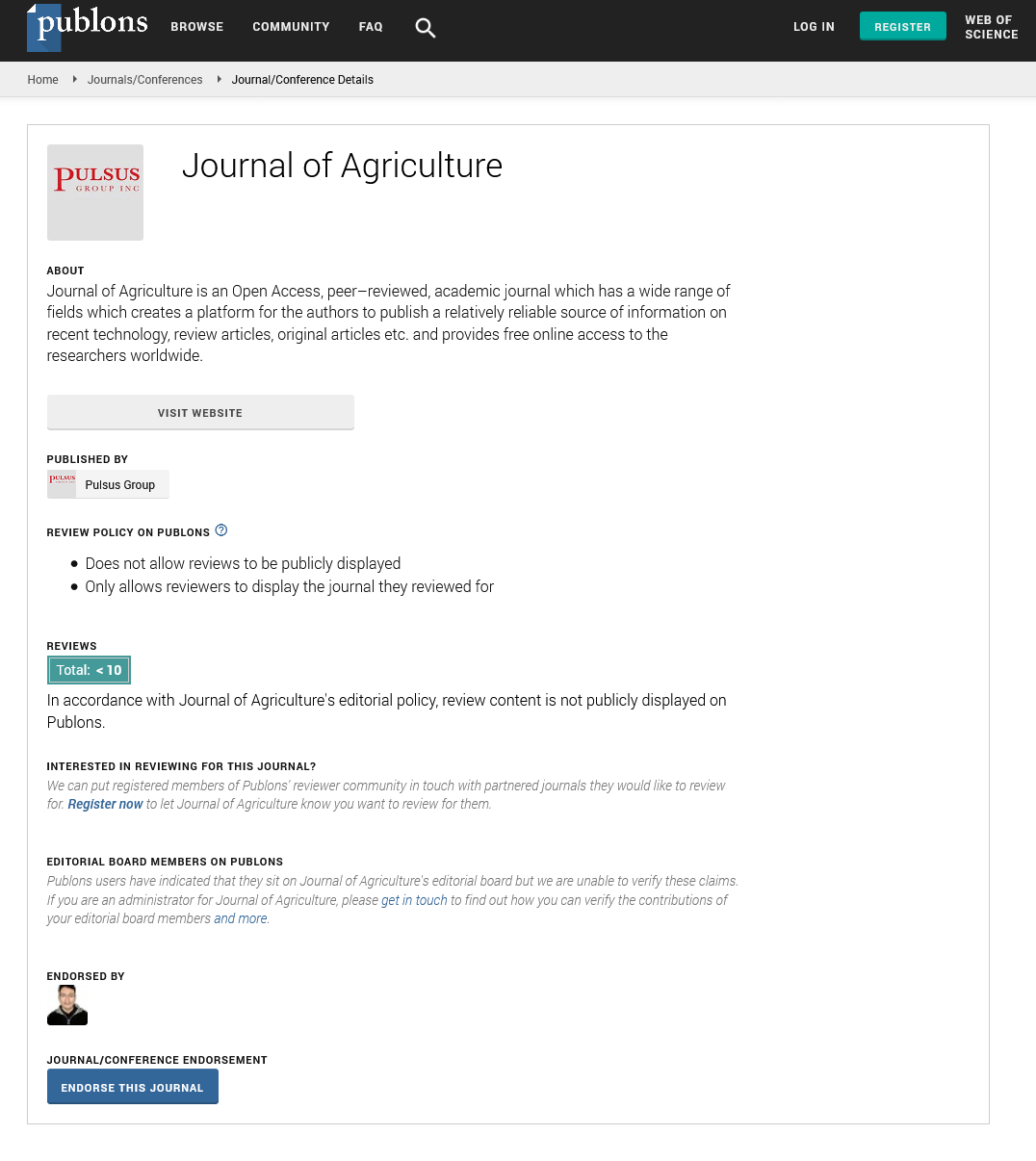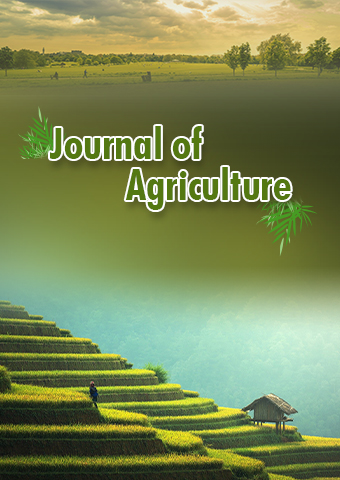Editorial - Journal of Agriculture (2023) Volume 6, Issue 4
Irrigation and Water Management: Ensuring Sustainable Agriculture and Environmental Stewardship
Amanda Farthing*
Department of Biotechnology, Quaid I Azam University, Islamabad, 45320, Pakistan
Department of Biotechnology, Quaid I Azam University, Islamabad, 45320, Pakistan
E-mail: Farthing3@gmail.com
Received: 01-Aug-2023, Manuscript No. jagri-23-108487; Editor assigned: 03-Aug-2023, Pre-QC No. jagri-23-108487 (PQ); Reviewed: 17- Aug-2023, QC No. jagri-23-108487; Revised: 22-Aug-2023, Manuscript No. jagri-23-108487 (R); Published: 29-Aug-2023; DOI: 10.37532/ jagri.2023.6(4).103-105
Abstract
Agriculture is the backbone of human civilization, providing the world’s population with essential food and resources. However, the ever-growing demand for food production has put considerable strain on global water resources, making sustainable irrigation and water management crucial for the future of agriculture and environmental stewardship. This abstract explores the significance of adopting innovative and responsible irrigation practices to safeguard both agricultural productivity and the planet’s delicate ecosystems. Effective irrigation techniques play a pivotal role in ensuring agricultural sustainability. By delivering water directly to crops in precise quantities and at optimal times, farmers can enhance crop yields while minimizing water wastage. Drip irrigation, sprinkler systems, and other advanced irrigation technologies have demonstrated their potential to conserve water, reduce energy consumption, and mitigate the detrimental impacts of water scarcity on crop cultivation. Water management strategies encompass a broader scope beyond efficient irrigation methods. Integrated water resource management, incorporating various sectors and stakeholders, is necessary to maintain a balance between human needs and ecological integrity. This approach emphasizes collaborative decision-making, basin-level planning, and equitable distribution of water resources, promoting sustainable agriculture and safeguarding the natural environment. The interconnection between irrigation and environmental stewardship cannot be overlooked. Mismanagement of water resources can lead to waterlogging, soil salinization, and the depletion of groundwater reserves. Such negative consequences not only threaten crop productivity but also harm ecosystems, compromising biodiversity and water quality. Embracing sustainable irrigation practices can mitigate these impacts and contribute to preserving the delicate balance of ecosystems.
Keywords
Agricultu • Food production • Environmental preservation • Policymaker • cosystems • Water wastage • Drip irrigation
Introduction
Irrigation and water management play a vital role in ensuring food security, supporting agricultural productivity, and promoting sustainable water usage. As the global population continues to rise, the demand for food increases, placing additional strain on already limited water resources. Effective irrigation and water management practices are essential to meet this challenge while safeguarding the environment and securing the well-being of future generations [1]. Climate change poses additional challenges to water availability, precipitation patterns, and temperature extremes. Adapting irrigation and water management practices to climate variability is critical in fostering resilience in agriculture and minimizing its ecological footprint. Incorporating climate data and predictive modeling can empower farmers to make informed decisions and optimize water use while reducing vulnerability to climate-induced risks. Irrigation and water management are indispensable components of sustainable agriculture and environmental stewardship [2]. By adopting efficient irrigation technologies, implementing integrated water resource management strategies, and considering climate adaptation measures, humanity can safeguard its food security, support ecological well-being, and promote responsible resource use for generations to come.
This abstract calls for policymakers, researchers, and agricultural practitioners to collaborate and prioritize investments in sustainable irrigation practices to ensure a harmonious coexistence between agricultural development and environmental preservation [3].
The importance of irrigation
Irrigation is the process of artificially supplying water to crops to maintain adequate soil moisture levels for optimal growth. While rainfall is essential for agriculture, it can be unpredictable and unevenly distributed. Irrigation helps mitigate the impact of droughts and water shortages, allowing farmers to cultivate a variety of crops throughout the year [4].
Types of irrigation systems
Surface irrigation: This traditional method involves flooding the fields, allowing water to flow over the soil surface. It is widely used in low-cost agricultural settings, but it can lead to water wastage and uneven water distribution [5].
Drip irrigation: Drip irrigation delivers water directly to the roots of plants, minimizing wastage and ensuring a more efficient use of water. It is particularly effective in areas with water scarcity. Sprinkler Irrigation: Sprinklers distribute water over the crops in the form of droplets, resembling natural rainfall. It covers larger areas and is suitable for a variety of crops [6].
Subsurface irrigation: In this method, water is supplied directly to the root zone from below the surface, reducing water loss due to evaporation and providing a more controlled environment for the plants.
The role of water management
Effective water management is essential to optimize water usage and prevent wastage. It involves monitoring, distributing, and utilizing water resources wisely to ensure equitable access for all users while maintaining ecological balance. Some key aspects of water management include:
Water conservation: Implementing watersaving technologies and practices, such as drip irrigation and rainwater harvesting, helps preserve water resources and reduces the overall environmental impact [7].
Water quality monitoring: Ensuring the quality of irrigation water is crucial to prevent soil degradation and reduce the risk of waterborne diseases. Regular testing and treatment of water sources are essential components of water management.
Crop selection and rotation: Choosing appropriate crops and rotating them strategically based on water requirements and climate conditions can optimize water usage and promote soil health [8].
Precision agriculture: By using advanced technologies like sensors, GPS, and data analytics, farmers can precisely monitor soil moisture levels, plant health, and weather patterns, allowing for more efficient irrigation scheduling and targeted water application.
Sustainable practices and environmental impact
Unsustainable irrigation practices can lead to several environmental issues, such as groundwater depletion, soil salinization, and reduced biodiversity. Therefore, adopting sustainable water management practices is critical to safeguard the environment. Some sustainable approaches include:
Integrated water resources management (IWRM): IWRM takes a holistic approach to manage water resources, considering social, economic, and environmental factors. It aims to balance the water needs of different stakeholders and maintain ecosystem integrity [9].
Rainwater harvesting: Capturing and storing rainwater can help replenish groundwater and reduce the burden on other water sources during dry periods.
Soil moisture monitoring: Regular monitoring of soil moisture levels helps farmers determine the optimal timing and quantity of irrigation required, preventing overwatering and conserving water.
Water-efficient technologies: Promoting the adoption of water-efficient irrigation systems and technologies encourages responsible water use among farmers.
Methodology
Irrigation and water management are crucial components of sustainable agriculture and environmental stewardship. Properly managed irrigation systems can enhance crop productivity, conserve water resources, and mitigate the negative impacts of water use on the environment. Here is an outline of the methodology for irrigation and water management to ensure sustainable agriculture and environmental stewardship [10,11].
Conclusion
Irrigation and water management are indispensable components of modern agriculture. As the global population continues to grow, sustainable water usage becomes even more critical. By embracing efficient irrigation techniques, practicing responsible water management, and promoting sustainable agricultural practices, we can ensure food security, protect the environment, and secure a better future for generations to come.
References
- Zhao J, Li M, Gu D et al. Involvement of rice histone deacetylase HDA705 in seed germination and in response to ABA and abiotic stresses.Biochemical and Biophysical Research Communications.470, 439-444(2016).
- Anderson JW, Ward K. High-carbohydrate, high-fiber diets for insulin-treated men with diabetes mellitus. Am J Clin Nutr. 32, 2312-21 (1979).
- Liu X, Luo M, ZhangW et al. Histone acetyltransferases in rice (Oryza sativaL.): phylogenetic analysis, subcellular localization and expression.BMC plant biology.12,1-17 (2012).
- Schwartz SE, Levine RA, Weinstock RS et al. Sustained pectin ingestion: effect on gastric emptying and glucose tolerance in non-insulin-dependent diabetic patients. Am J Clin Nutr. 48, 1413-7 (1988).
- Anderson JW, Ward K. High-carbohydrate, high-fiber diets for insulin-treated men with diabetes mellitus. Am J Clin Nutr. 32, 2312-21 (1979).
- Shah J, Ali A. Combined effect of Bacillus fortis IAGS 223 and zinc oxide nanoparticles to alleviate cadmium phytotoxicity in Cucumis melo. Plant PhysiolBiochem. 158, 1-12(2021).
- Reverter M, Sarter S, Caruso D et al. Aquaculture at the crossroads of global warming and antimicrobial resistance. Nat Commun.11(1), 1870-1879 (2020).
- Nesar A, Thompson S, Giovanni M. Organic aquaculture productivity, environmental sustainability, and food security: insights from organic agriculture.Food Security.12, 1253-1267 (2020).
- Kiran P, Adi J. Aquaculture role in global food security with nutritional value: a review.TranslAnimSci. 3(2), 903-910 (2019).
- Ogello EO, Mlingi FT, Nyonje BM et al. Can integrated livestock-fish culture be a solution to East Afircan's food insecurity? A Review.African J Food Agric Nutr Dev.13 (4), 8058-8078 (2013).
- Asiedu K, Berchie FKE, Iddrisu S et al. Prospects and sustainability of aquaculture development in Ghana, West Africa.Cogent Food & Agricultur.3(1), 1349531 (2017).
Indexed at, Google Scholar, Crossref
Indexed at, Google scholar, Crossref
Indexed at, Google Scholar, Crossref
Indexed at, Google scholar, Crossref
Indexed at, Google scholar, Crossref
Indexed at, Google Scholar, Crossref
Indexed at, Google Scholar, Crossref
Indexed at, Google Scholar, Crossref
Indexed at, Google Scholar, Crossref


